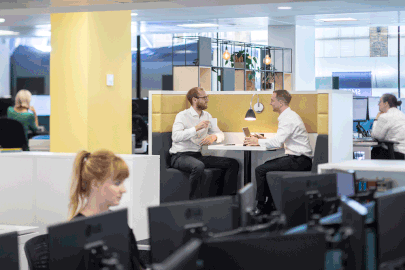Why your company should be considering agile working

One of the reasons agile working is difficult to pin down is that there is no one size fits all. It has common themes but is essentially individual and involves choice in the how, what, where and when of working.
The British Computer Society defines agile working as “a way of working in which an organisation empowers its people to work where, when and how they choose – with maximum flexibility and minimum constraints – to optimise their performance and to do their best work”.
The Royal Institute of Chartered Surveyors (RICS) describes agile working as “work as an activity, not a place” and it is this definition that points to the substantial cost savings that agile working offers organisations.
Agile working is more than working in a different way, it is being and behaving differently. It is transformational. It embraces both the physical and digital “workplace” in empowering and supporting people to work where, when and how they choose to maximise their productivity, innovation and ultimately to deliver best value to the organisation.
The impact on an organisation that adopts an agile working policy can be dramatic by enhancing individual productivity, promoting trust relationships, increasing staff engagement and retention, and by enabling substantial cost reduction in terms of facilities, building, travel, parking and office space.
Agile workspaces are being seen more frequently with break out spaces, hot desks and rest areas in place of traditional desk banks – which can have a huge impact on the amount of office space needed.
With office space at a premium (rental rates in London circa £40-£90 per sq. ft.), agile working is a business trend that makes sound financial sense. Find out how agile working can impact your organisation with a free consultation from the Interior Works today.
The British Computer Society defines agile working as “a way of working in which an organisation empowers its people to work where, when and how they choose – with maximum flexibility and minimum constraints – to optimise their performance and to do their best work”.
The Royal Institute of Chartered Surveyors (RICS) describes agile working as “work as an activity, not a place” and it is this definition that points to the substantial cost savings that agile working offers organisations.
Agile working is more than working in a different way, it is being and behaving differently. It is transformational. It embraces both the physical and digital “workplace” in empowering and supporting people to work where, when and how they choose to maximise their productivity, innovation and ultimately to deliver best value to the organisation.
The impact on an organisation that adopts an agile working policy can be dramatic by enhancing individual productivity, promoting trust relationships, increasing staff engagement and retention, and by enabling substantial cost reduction in terms of facilities, building, travel, parking and office space.
Agile workspaces are being seen more frequently with break out spaces, hot desks and rest areas in place of traditional desk banks – which can have a huge impact on the amount of office space needed.
With office space at a premium (rental rates in London circa £40-£90 per sq. ft.), agile working is a business trend that makes sound financial sense. Find out how agile working can impact your organisation with a free consultation from the Interior Works today.
Find out what we feel are the 8 key elements of a great place to work.

